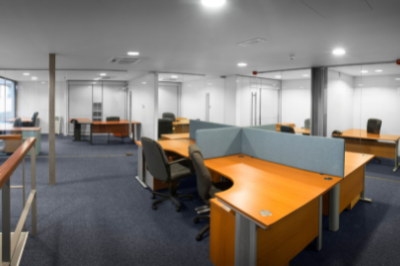

Photo By: Canva
South Africans have always been innovative. From the mechanical pool cleaner (otherwise known as a Kreepy Krawley) to Pratley glue, our innovation has led propelled us into the global spotlight.
But we are also not immune from the challenges that the world currently faces. Last week, Turnaround Talk published an article which points to the fact that hybrid working environments are becoming more common and that there will be a lot more empty offices in the years to come. I recently read an article on entrepreneur.com which highlights how you can profit from your empty office space.
Private events
In the aftermath of the pandemic, many people are looking for clean spaces to meet up and organize private events. From book clubs to birthday parties, weddings, and baby showers, your vacant office could be the key to helping people gather and celebrate safely.
Before advertising your commercial space for rent, consider which types of events would work best and what you might need to upgrade to make it as appealing as possible to potential customers.
Nothing screams innovation like: when life gives you lemons, make lemonade and throw a lemonade party.
Professional training
Some companies aren’t bringing workers back to the office and may have closed their physical location. However, but they may need a place to host occasional meetings or provide staff training.
For example, corporations might want to host workshops on sales techniques, and non-profits may need high-tech offices to facilitate global remote meetings.
Let others feed off your innovation.
Pop-ups
A pop-up is a short-term retail store, such as a holiday craft shop, summertime brewery, food market, or clothing retailer. They typically last a few days or weeks, which is beneficial if you don’t want to commit to a long-term rental contract.
As the world recovers from the pandemic and people are looking for things to do outside their homes, pop-ups can be excellent ways for businesses to increase brand awareness and revenue.
Innovative thinking has always been at the heart of retail.
Co-working space
Since millions of workers have been confined to their homes for more than a year, many would be glad to pay for a place where they can concentrate on work, hold meetings, and make human connections.
Turning your empty office into a co-working space could be an excellent option if you have desks, chairs, internet access, phone lines, and a few conference rooms where people can take calls. If you have amenities such as an exercise studio, kitchen, and lounge, they could add significant value to your space.
Sharing costs is an innovative answer to addressing cash flow problems.
Photography studio
You can also turn your unused commercial real estate into a place that’s well-suited for photographers. Many professional photographers need large spaces to set up equipment, invite clients for photoshoots, or take photos of clients’ products.
Your office could benefit photographers who want to show professionalism but need the flexibility of a short-term contract. If you’re interested in this option, consider whether your office has good lighting, storage space, and a clean design that would be appealing to photographers.
This is a very innovative, and creative solution.

Photo By: Canva
Another option
It must be pointed out that not every business is suited to a remote or hybrid working environment. Some professions benefit from collective collaboration and need office bound workers.
Renting it out is an innovative solution to your problem.
However, certain boxes need to be ticked before making this decision:
- Evaluate your offer. Based on factors such as how long you can rent your space and its square footage, facilities, and amenities, consider the types of events that may work best. For instance, a book club may want to use your conference room, while a wedding party would need a kitchen. Create a list of possible clients based on what you have to offer;
- Consider your risks. What might happen if you rent out your space? The risks vary but could include theft, injury and damage. Ask your insurer what type of coverage you need, such as commercial liability insurance, and if renters should sign a waiver of liability agreement;
- Establish safety standards. Set rules for anyone who’s planning to rent or step foot inside your building. For instance, you might require people to wear masks and sanitize the space before leaving. That way, you can keep them safe and protect your interests;
- Check legal limitations. If you’re currently renting your office, check your lease to see if you can sublet it to others. If you can, check local laws about safety, inspections, parking regulations and tenant rights before signing a contract; and
- Calculate the costs of keeping the space open. Add up how much it would cost to make upgrades, add furniture, run the utilities, hire someone to clean, and conduct reference or background checks. You’ll need to factor these costs into the price you charge or include them in agreements with renters or tenants.




